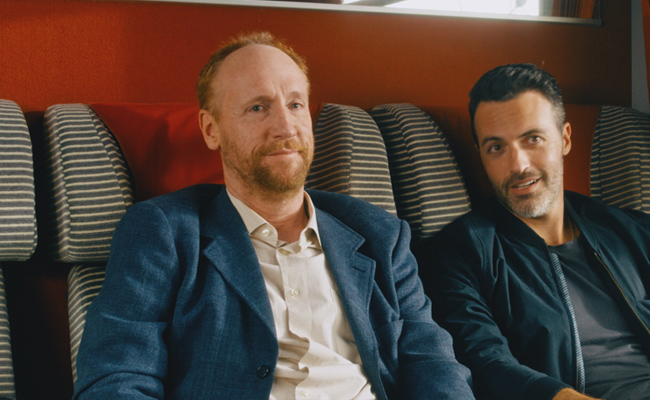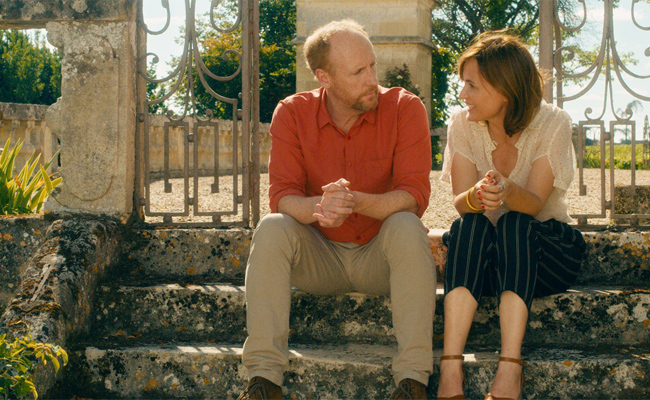
For years, Matt Walsh was just that guy who would pop up in minor roles in sketches and in Todd Phillips movies, perhaps best known for his mini-monologue to Luke Wilson’s character in Old School begging to join the fraternity: “You listen to me. I need this, okay? My wife, my job, my kids. Every day is exactly the same. I go golfing on Sundays. …I hate golf.”
Walsh’s role as Selina Meyer’s long-suffering press secretary Mike McClintock on Veep has made Walsh much more of a household name, or at least a household face, though in many ways he’s still playing a version of that same working stiff who hates his life. Ironic considering Walsh, as one of the founding members of the UCB comedy troupe (along with Amy Poehler, Matt Besser, and Ian Roberts) which now has successful comedy venues in multiple cities), seems to have figured out a way to skip the rat race early on. Being able to parlay having the face of a beaten-down everyman into a life as a successful, working creative seems like some version of the American Dream, or finding a glitch in The Matrix, depending on your metaphor.
It’s still working. This week Walsh plays Stuart, an unemployed former bourbon salesman who tries to get his groove back by asking a friend’s 20-something daughter to marry him on a trip to Paris in Under The Eiffel Tower (which was released via streaming this week). She turns him down, sending him off on a mid-life crisis journey of self-discovery with a Scottish footballer played by Veep‘s Reid Scott and a French vineyard owner played by Judith Godreche. I spoke to Wash this week by phone.
I was curious about your struggle to become a full-time creative. Did you have to get part-time jobs on the way? What was that like?
As an actor?
Yeah, as an actor.
Well, when I started I was painting houses and I was moving furniture for a living. And then I delivered pizzas for a while. I did well in Chicago, and then at night I was doing shows seven nights a week. Comedy shows. And then I moved to New York in 1996 and I was surviving on sort of selling my van. Once I sold my van I had some rent money for a few months. Then fortunately we were, I think, subsidized by our friends who were writers at Conan O’Brien and Saturday Night Live. So our friends would throw us a sketch here and there so we could start working as actors when we landed in New York. So that was also good fortune.
That’s pretty cool. Who were those friends? Did you guys have any sort of pact? Or was that just sort of a thing that came about?
There was sort of always a great bond with the Conan O’Brien crew. Andy Richter was a good friend from Chicago, and he sort of had connected us to that show. Then Adam McKay started at Saturday Night Live. So between Tom Gianas and Adam McKay were writers there, and Horatio [Sanz] eventually came along to the show. So we had like friends at Conan, writers like Brian Stack and Brian McCann, and John Glasser. It was a lot of Chicago people.
So then there wasn’t like one day where you got a certain job and that was the day where you were like, “Well, now I can quit delivering pizzas or painting houses or whatever?”
You know, I was working for my father, and I was a salesman, and I got hired to be a touring company member for the Second City. In Chicago, you could make a living touring a little bit. So I quit working for my father and I never had to have what I would consider a real job after that.
What were you selling?
I was in machinery and moving. Like installation at factories, like all the heavy industry would occasionally retool and you’d take out their old machines and put in their new machines. Or if companies would move across the country, you would dis-assemble them. You’d have to put ’em on trucks. Very industrial, specialized industry. I was terrible at it. I hated it. I mean, it was interesting to go into a factory and see how things are made. But to be responsible for calculating how to do it, making it happen, I didn’t like that. It’s a very intricate mechanical processes, and very expensive machinery, so it was a little nerve-wracking. I was glad to get out of it.
As a founding member of U.C.B., how involved are you in all the theaters and their various projects? It seems like it’s a pretty big entity now.
I pay attention to emails every day and weigh in on stuff as much as I can.
What was your initial idea when you guys founded it? Did you have any idea of what it was gonna eventually become?
No. I don’t think anybody could. I think it was simply to have a clubhouse to do our shows and have our friends do their shows there. To start the long-form improv scene in New York.
Were you just sort of trying to model a New York scene after Chicago? Or did you guys have a model of what you were trying to do when you started it?
I think we had our own take on it, certainly. I mean, definitely was inspired by what we learned in Chicago, but we had our own take and philosophy. There’s a book, if you want to know about it. There’s a book about how to improvise. We wrote it.
What do you think is the dumbest character you’ve ever had to play in a sketch or in improv?
That’s a tough question. I don’t have a good answer for that one. I’m sorry, Vince.

So in this movie, Under The Eiffel Tower, there are a lot of people from Veep in it. What was the connection there? Did they just poach all of you?
They’re friends. Many of the people in the movie, because it’s a true indie, came over to make a movie in France for no money. So I used funny people that I already knew, like David Wain, Michaela Watkins, Reid Scott, and they were very game to come over to France and shoot a movie.
Right, so how much does getting to go to France factor into that decision when you’re looking to do a movie like this?
I think a lot of Americans, it’s very interesting. Yeah, we love to go over there.
So you were part of the casting process for this?
Yeah. I was a producer, did some writing, so… it was good.
What was the initial idea for the movie?
Two guys named Archie Borders and David Henry wrote a story about a friend who thick-headedly proposed to another family’s daughter who was like 20 years younger than him and ruined their vacation in Europe. So they began the story with that premise. And then the script came into my life a few years ago. And then I met Judith (Godrèche), we met randomly at some event, and we decided to work together and make a go of it. We became producers and did whatever we could to make it happen.
Was this influenced by other romantic comedies set in France? Do you think that’s a fertile setting for this type of story?
I think there’s an escapism. Like I said, Americans love going to France. And it’s a different culture. They have a different pace, and it’s a really different way to go about living. And I think romance, Paris, the Eiffel Tower are iconic, romantic destinations. The challenge was like, the romantic comedy has to deliver all of those sort of tropes, or cliches, which is you have a misunderstanding which pushes you further away. Then you have to come back in the end and profess your love and realize you may not get what you want, but if you do it openly and honestly you might get what you want. But you have to make those moments surprising and interesting. I think our focus on set was to be as naturalistic and let the dialogue play as realistically as possible. I think a lot of effort and conversation and thought went into that. I think that’s what’s charming about the film.
Your character is a bourbon guy. Is that something that you are into yourself?
I’ll sip a little bourbon, yeah. At a wedding. It’s a good wedding drink. Watch a storm roll in, drink a bourbon. That’s a good night.
You’re at the stage of your career where you’re a pretty successful character actor. One thing I’ve always wondered with character actors, do you feel pressure to take every job so you can keep working? Do you ever end up over-working yourself out of fear that the next job won’t come?
I don’t think I over-work myself. But I do think that I have a good work ethic and I do have a bit of a workaholic gene. I do like working. I love what I do and I like creative endeavors, stepping into them and bringing comedy to fruition. I do really enjoy that. But as a working character actor, yes, you do want to stay busy.
Vince Mancini is on Twitter. You can check out his archive of movie reviews here.






